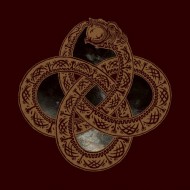 It starts with a lone clean guitar – plaintive, bleak, reflective. And then, the weight – crushing doom-laden chords, toms booming with cathedral levels of reverb, the melancholic essence of the initial refrain still intact. An incredible opening and over the course of the next ten minutes, ‘Birth and Death of the Pillars of Creation’ shows itself as one of the finest tracks Agalloch have yet crafted.
It starts with a lone clean guitar – plaintive, bleak, reflective. And then, the weight – crushing doom-laden chords, toms booming with cathedral levels of reverb, the melancholic essence of the initial refrain still intact. An incredible opening and over the course of the next ten minutes, ‘Birth and Death of the Pillars of Creation’ shows itself as one of the finest tracks Agalloch have yet crafted.
So yes, it’s an impressive start to this long-awaited fifth album from Portland’s finest purveyors of atmospheric metal. Four years it has been since ‘Marrow of the Spirit’, an album that very much divided opinion upon release. The passage of time has shown that record to be a strong release in spite of the problematic production – nevertheless, the band have obviously learned a lot in the intervening years. Regular live performances have clearly strengthened them as a unit and a by-now established working relationship with veteran producer Billy Anderson has reaped clear dividends – all of these factors contributing to render ‘The Serpent and the Sphere’ as one of the most cohesive, powerful records they have yet recorded.
Opening with a ponderous, doomy number is a brave but ultimately inspired choice. It’s Agalloch at their strongest – brooding and doleful, yet shot through with some surprisingly catchy melodies, the chiming lead notes quickly worming themselves into the brain. The first of three classical interludes follows (performed by Musk Ox’s Nathaniel Larochette) before the second full track ‘The Astral Gods’ takes off and ups the pace considerably. Bringing to mind elements of ‘I am the Wooden Doors’ from 2002’s ‘The Mantle’ it’s driving, drum-led power is given real power and authority by Billy Anderson’s production. It is here also that drummer Aesop Dekker demonstrates what a boon he is for the band, adding a sense of urgency and propulsion to John Haughm and Don Anderson’s riffing. Mainman Haughm’s vocals also reach some of the most brutal tones he has yet delivered on record.
‘Dark Matter Gods’ doffs the cap to the early-80s guitar-wave scene of which the band are obvious fans. The clean chords that usher in the track and play over the verse owe more than a passing resemblance to Sad Lovers & Giant’s ‘Feeding the Flames’ album from the early 80s and in the context of Agalloch’s work, makes perfect sense. The bass guitar shines through here also, Jason Walton’s rich, growling tone anchoring the more delicate guitars perfectly. Next up is ‘Celestial Effigy’, the track released by the band prior to the album. It’s almost an Agalloch ‘best-of’, its seven-minute duration covering many of the tones and themes explored by the band over their career. It’s a solid song, granted, but for me one of the least compelling here if only for a sense of over-familiarity with some of the ideas/melodies contained within.
The second interlude grants us some solace before we are thrown back into ‘Vales Beyond Dimension’, another song which explores a variety of tones. There’s a palpable sense of darkness to the riffing here, the band moving away from the pining melancholy that typifies much of their guitar work into more typically metal (and even death metal) tones. Ponderous riffs and shrieking solos again bring to mind some of the efforts of earlier doom-death acts from these very isles such as Paradise Lost or Anathema, fading out into an ambient sea of synths.
From this cosmic maelstrom, instrumental closer ‘Plateau of the Ages’ takes us on one last journey, resolving this hour-long plus opus with a monolithic and strident run through of affecting passages. Attendees of recent Agalloch live shows will recognise the glittering refrain half way through the song (used as a droning coda at the end of the shows whilst Haughm wreaks havoc on his guitar strings with a deer hoof) – here it plays out over a shifting chord progression to describe a monumental peak of mournful exultance. If that last statement sounds oxymoronic then I make no apologies for this – Agalloch’s work has always hit its high points through juxtaposition, of a deft balance between sorrow and triumph and this final track is no exception. Along with the opener, this final ‘full’ track represents another definite peak on the album, bringing us full circle on our journey as a whole. Larochette’s final piece ‘Serpens Cauda’ acts almost as an instrumental epilogue and truth be told, doesn’t add a huge amount at this point on the record, particularly in light of the epic power that precedes it.
It’s a remarkable achievement. A band with such a dedicated following and respected back catalogue can generally either opt to play it safe or try and fly in the face of convention, reinventing and risking jettisoning their whole identity. With ‘The Serpent and the Sphere’, Agalloch have taken some of the more experimental notions of their ‘Faustian Echoes’ EP from 2012 and alloyed these with an even more focussed approach, all the while maintaining that core ‘Agalloch’ sound. It’s no mean feat but this latest record demonstrates clear evolution, an advancement of their sound yet staying true as ever to their roots. Yes, for this scribe, there might be the odd ‘by the numbers’ moment (by Agalloch’s lofty standards) but for a record of this much depth and clear songwriting consideration, it’s a minor gripe. Having lived with it for a month or so now, I am quite happy to stick my neck out and confidently state this is Agalloch’s best record yet.
(9/10 Frank Allain)

Leave a Reply